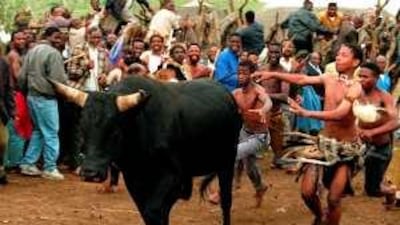JOHANNESBURG // At the Zulu royal palace in Nongoma last weekend, about 30 unarmed young warriors chased a bull around an enclosure, trapped it and wrestled it to the ground. Smothering the animal, they suffocated it to death, and the harvest was seen as safe for another year.
Many Africans combine traditional practices such as ancestor worship with monotheistic religions such as Christianity in their belief systems, and the ukweshwama, or first fruits, ceremony is a centuries-old ritual to give thanks for the forthcoming crops. But this year it caused unprecedented controversy after an animal rights group went to court on Friday to demand it be banned on the ground that the bare-handed killing amounted to cruelty to the bull. According to their claims, it takes the bull more than 20 minutes to die, during which it suffers terribly.
South Africa is one of the most diverse countries in the world, but the social and economic unification of the races in the post-apartheid era remains a work in progress, and the case triggered an unusually open clash of cultures, with accusations of racism and arrogance. At the ukweshwama festival on Saturday, King Goodwill Zwelithini, the Zulu ruler, defiantly condemned the occasion's critics. "How dare they tell us about our beliefs on how to nourish our nation? What happens here inside the royal palace is the climax of how our families are built.
"A nation without its customs and beliefs is likely to be lost forever. "This - informs us of who we are, where we are coming from and where we are going." Deference to traditional leaders remains widespread in South Africa, particularly in rural areas, and kings, who retain authority over traditional matters in their territories, are paid stipends by the state. The king told his subjects at the festival they should respect other cultures and beliefs, whether they consider them right or wrong. About Zulu life, he added: "They say we abuse animals, this is talking without sense. We love and appreciate animals."
The South African president, Jacob Zuma, a Zulu who as a boy grew up herding his family's cows in Nxamalala, attended the ceremony to show his support. He did not address the controversy, but his spokesman, Zizi Kodwa, wrote an opinion piece on the subject carried in several newspapers in his "personal capacity" - a device often used in South Africa when officials want to express themselves without formally linking their office to their views, even though the implication is unambiguous.
Mr Zuma, a conciliator by instinct, has made a point of reaching out to all communities in South Africa, but Mr Kodwa's language was unusually strident. It is clear that the animal rights group's legal action touched a nerve in the presidency - which, with the ruling African National Congress hoping to draw in the Zulu-based Inkatha Freedom Party, may also have seen an opportunity to align itself with its concerns.
The animal rights activists, Mr Kodwa wrote, were acting "out of desperation and the desire to impose their civilisation". The case was "absurd", and they were motivated by "racism that is cloaked as defence of animal rights". "The slaughtering of cattle carries a particular significance in African culture, as it does in many other countries in the world. The disrespect and contempt for African culture and traditions demonstrated by the debate demonstrates the utter hypocrisy of those who have anointed themselves voices of reason. This is reminiscent of the arrival of the European settlers on our shores who declared that our people were barbaric heathens who needed to be civilised.
"For centuries we have been bombarded with the lie that African people, their values and beliefs, were inferior to those of their western counterparts." The ANC weighed in as well, in an official capacity, saying: "The matter of cultures and practices of our people is a subject that is sacrosanct." But Michele Pickover, a spokeswoman for Animal Rights Africa, which brought the legal action, said accusations of racism were "inaccurate and untrue".
"Societies are always changing. Culture is capable of significant adaptation as circumstances change. "Not all traditions are worthy of admiration and respect. Tradition should never be an excuse for cruelty, and surely harmful practices should not be condoned just because they are cultural practices," she said, citing cannibalism, infanticide, slavery, and bear-baiting as examples, among others.
"Our humanity and humility is at stake," Ms Pickover said. South Africa has laws against animal cruelty, but it also has constitutional guarantees of cultural, religious and linguistic rights. Still, the outcome of the case was in little doubt, particularly given the risk of offending South Africa's largest tribe. Judge Nic van der Reyden, who heard the case and ruled against the rights group, cited the Soweto uprising in 1976 - when the township's children revolted against the imposition of Afrikaans-language teaching in schools - as an example of the potential consequences of cultural interference.
"They are a very proud nation," he said of the defendants. "The British lost their battles to the Zulus." sberger@thenational.ae

